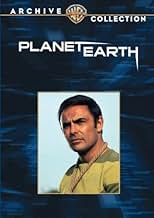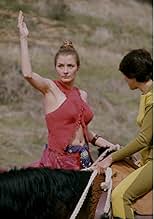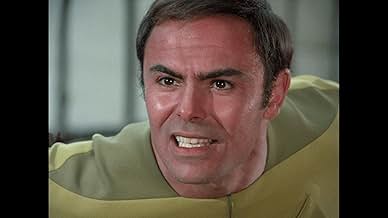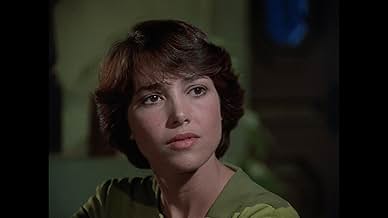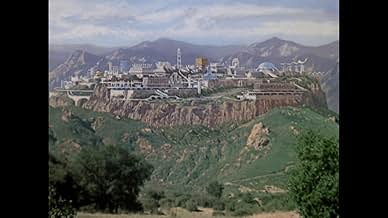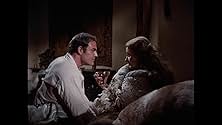A 20th Century man wakes up in 2133, where men are slaves and women rule.A 20th Century man wakes up in 2133, where men are slaves and women rule.A 20th Century man wakes up in 2133, where men are slaves and women rule.
Jo de Winter
- Villar
- (as Johana De Winter)
Corinne Camacho
- Bronta
- (as Corrine Camacho)
Sue Dahlman
- Thetis
- (as Sara Chattin)
Robert Sutton
- Kreeg Captain
- (as Raymond Sutton)
Featured reviews
This movie was pretty awesome, with great acting(especially by Ted Cassidy and Diana Muldaur), decent special effects, and a good story. Star Trek's Gene Roddenberry, his friend Robert H. Justman, and Star Trek legend director Marc Daniels wove this tv-movie really well. It's available for rent and if you are a sci-fi fan, rent this. I guarantee you you'll like it!
Apparently, networks at the time were only comfortable with one sci-fi series at a time.
CBS picked "Planet of the Apes" over Genesis II, and ABC picked "Six Million Dollar Man" over Planet Earth.
The main character in each was Dylan Hunt, though they were played by different actors. This is interesting because when Roddenberry made the second Star Trek pilot, he gave the new lead actor a new name. (Capt. Pike became Capt. Kirk)
The name Dylan Hunt would be used in Andromeda, which was an outer space version of Planet Earth, which in turn was a land-based version of Star Trek.
The script for Star Trek: The Motion Picture was based on an unused Planet Earth script. In fact, several of the first season episodes of ST: TNG were written for either the unrealized new Star Trek series in the 70s, or Planet Earth,
Roddenberry believed in recycling.
CBS picked "Planet of the Apes" over Genesis II, and ABC picked "Six Million Dollar Man" over Planet Earth.
The main character in each was Dylan Hunt, though they were played by different actors. This is interesting because when Roddenberry made the second Star Trek pilot, he gave the new lead actor a new name. (Capt. Pike became Capt. Kirk)
The name Dylan Hunt would be used in Andromeda, which was an outer space version of Planet Earth, which in turn was a land-based version of Star Trek.
The script for Star Trek: The Motion Picture was based on an unused Planet Earth script. In fact, several of the first season episodes of ST: TNG were written for either the unrealized new Star Trek series in the 70s, or Planet Earth,
Roddenberry believed in recycling.
This might be enjoyed best as a review of 40-year old television effort. Gene Roddenberry is best remembered for Star Trek, but this Air Force veteran was writing well before the 1966 show hit the airwaves.
"Planet Earth" can be enjoyed on its own, but I got the opportunity to watch "Genesis II" first. Both these television pilots are based on the same story of a scientist suspended in time for 160 years. The world has mostly destroyed itself and we're invited for a collection of never-to-appear stories of the survivors bringing mankind back.
This story premise and those from Star Trek pivot on some type of Third World War wiping about most of our civilization. While Star Trek plots all seems to share the idea that mankind has evolved into a better kind of person, Planet Earth did not display that sensation to me; and maybe that's the problem. The illusion of an improved man seemed to led the following of Trekkers, plus the boundless story opportunities of visiting other planets. There was no way to expect that sense of wonderness with this story. Even though this future is probably a truer presentation of mankind following such a war, people like illusions and the lies to make us feel better.
Also interesting to see is the kind of loyalty Roddenberry has with actors. Like using DeForest Kelley, Leonard Nimoy, Nichelle Nichols and Majel Barrett (who he later married) on previous projects and then including them in Star Trek, Planet Earth cast includes Star Trek Alumni Diana Muldaur, Ted Cassidy and of course Majel.
I don't recall seeing either of the pilots (Genesis II or Planet Earth) in 1974 but I'm fairly sure I wouldn't been very intrigued by them. Roddenberry's humanists views are quite evident in all his material, which can make it difficult to fully engage in his stories. Star Trek, for the most part, worked well -- Planet Earth didn't. John Saxon acting and fight-scenes are better in other productions. Diana Muldaur is a very strong actress with great presence, but her character here was tiresome and I just wanted her to go away. I was looking forward to anything interesting for Ted Cassidy, but we barely see him.
So if you're interested in shows from the 70s or in Roddenberry, watch Planet Earth and possible Genesis II, but don't be disappointed that a new story franchise was not born.
"Planet Earth" can be enjoyed on its own, but I got the opportunity to watch "Genesis II" first. Both these television pilots are based on the same story of a scientist suspended in time for 160 years. The world has mostly destroyed itself and we're invited for a collection of never-to-appear stories of the survivors bringing mankind back.
This story premise and those from Star Trek pivot on some type of Third World War wiping about most of our civilization. While Star Trek plots all seems to share the idea that mankind has evolved into a better kind of person, Planet Earth did not display that sensation to me; and maybe that's the problem. The illusion of an improved man seemed to led the following of Trekkers, plus the boundless story opportunities of visiting other planets. There was no way to expect that sense of wonderness with this story. Even though this future is probably a truer presentation of mankind following such a war, people like illusions and the lies to make us feel better.
Also interesting to see is the kind of loyalty Roddenberry has with actors. Like using DeForest Kelley, Leonard Nimoy, Nichelle Nichols and Majel Barrett (who he later married) on previous projects and then including them in Star Trek, Planet Earth cast includes Star Trek Alumni Diana Muldaur, Ted Cassidy and of course Majel.
I don't recall seeing either of the pilots (Genesis II or Planet Earth) in 1974 but I'm fairly sure I wouldn't been very intrigued by them. Roddenberry's humanists views are quite evident in all his material, which can make it difficult to fully engage in his stories. Star Trek, for the most part, worked well -- Planet Earth didn't. John Saxon acting and fight-scenes are better in other productions. Diana Muldaur is a very strong actress with great presence, but her character here was tiresome and I just wanted her to go away. I was looking forward to anything interesting for Ted Cassidy, but we barely see him.
So if you're interested in shows from the 70s or in Roddenberry, watch Planet Earth and possible Genesis II, but don't be disappointed that a new story franchise was not born.
If you're an obscure-movie buff like me, find "Planet Earth" and watch it. I loved it. It's sexually suggestive, it's got mutants, underground trains connecting the whole Earth, mystics and doctors and it's totally entertaining. John Saxon as Dylan Hunt is very expressive, and I swear I could watch it again and again. In a way, it's very much a prequel to Enterprise and follows suit with the usual Roddenberry ideologies. In fact, all the acting is good. Look for Gene Roddenberry's wife in the face of extras, as well as a few other recognizables. Diana Muldaur (who later played Dr Pulanski in The Next Generation) is very attractive as the domineering slave-trader and I find myself envying John Saxon in certain parts of the film - well, see for yourself! A great 60 minute flick!
In his book "Star Trek Movie Memories" William Shatner describes Roddenberry's career in the early 70's.
With regards to "Planet Earth", it's stated that the network passed on the series because it was felt that it could only afford 1 expensive science fiction television series.
The other choice was "Planet of the Apes". Because of the franchise success of the "Apes" films, it was felt by network bigwigs that an "Apes" TV series was the better bet and had more of a chance of being a hit.
As it turned out, the "Apes" series tanked after 13 episodes.
Hal
With regards to "Planet Earth", it's stated that the network passed on the series because it was felt that it could only afford 1 expensive science fiction television series.
The other choice was "Planet of the Apes". Because of the franchise success of the "Apes" films, it was felt by network bigwigs that an "Apes" TV series was the better bet and had more of a chance of being a hit.
As it turned out, the "Apes" series tanked after 13 episodes.
Hal
Did you know
- TriviaThe outdoor scenes were filmed at The University of California, Riverside due to the many "futuristic" architectural features.
- ConnectionsFollows Genesis II (1973)
Details
Contribute to this page
Suggest an edit or add missing content


